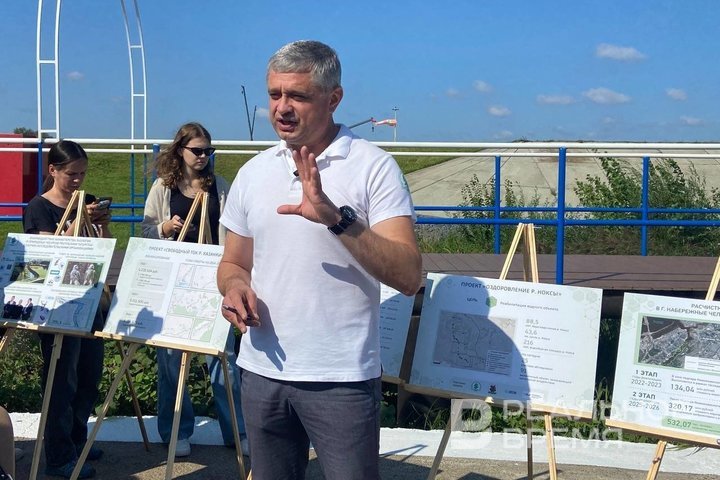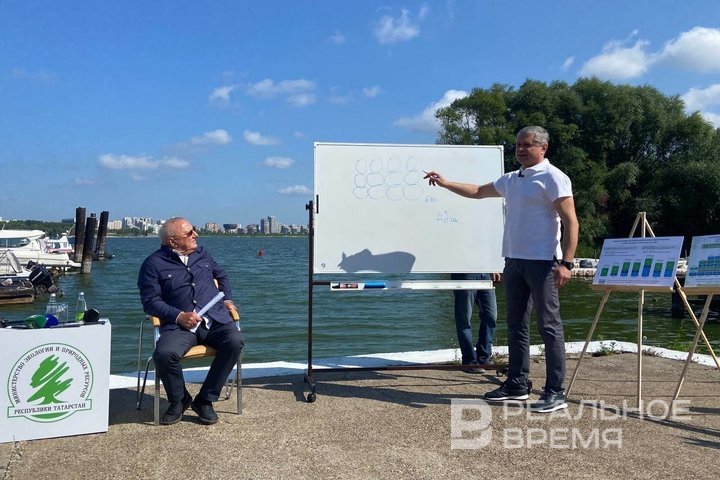A new national environmental project in Tatarstan, but the reclamation of sludge fields is postponed 17:05, 22.08.2024
The head of the Ministry of Environment of Tatarstan Alexander Shadrikov presented a new Environmental Well-Being national project and spoke about the republic's plans for it

Abnormal precipitation at the beginning of the year and the replacement of imported reagent with a domestic one caused the postponement of the reclamation of sludge fields in Kazan. According to the Minister of Ecology and Natural Resources of Tatarstan Alexander Shadrikov, it has now become part of Water of Russia federal project within the framework of the new Environmental Well-Being national project whose launch is scheduled for 2025. It is also expected to include the renovation of treatment facilities for 18.3 billion rubles and the improvement of 29 water bodies for 4.4 billion rubles. Read about further environmental plans of Tatarstan in a report of Realnoe Vremya.
“We are working with the Ministry of Environment of Russia to finally finalise our figures”
This year, Environment national project that has been in effect since 2019 is coming to an end. Over the five years, 22.7 billion rubles have been allocated for it from the federal and regional budgets. Since 2018, a total of 60.5 billion rubles have been spent on environmental protection measures in Tatarstan. During this time, potential damage worth 65.6 billion rubles has been prevented.
Starting next year, the new national project Environmental Well-Being will be in effect in Russia from 2025 to 2030. It has already included seven events worth 1.3 billion rubles.
The national project will consist of six federal projects:
- Water of Russia. It will combine the areas of the Improvement of the Volga River and Preservation of Unique Water Bodies federal projects. The total funding is 210.15 billion rubles.
- General Cleaning. It will replace Clean Country federal projects. It will receive 157.3 billion rubles.
- Closed Cycle Economy. It will replace Integrated System for Municipal Solid Waste Management federal project. Financing will amount to 554.1 billion rubles.
- Clean Air. It will receive 127.1 billion rubles.
- Forest Preservation — 159.3 billion rubles.
- Preservation of Biodiversity and Development of Ecotourism — 46.1 billion rubles.
According to Alexander Shadrikov, Tatarstan proposes to include the construction and renovation of 17 treatment facilities and storm drains for 18.3 billion rubles in Water of Russia (previously called The Volga Recovery) federal project,t including in Kazan and Naberezhnye Chelny.The list also includes projects in Laishevo, Menzelinsk, Buinsk, Kukmor, Kamskiye Polyany, Aktanysh, Kamskoye Ustye, Urussu and Muslyumovo. The project of Vodokanal water supplier for cleaning wash water from the Volga water intake was also submitted to the Ministry of Enviornment for consideration.
Another application of the republic concerns the environmental improvement of 29 water bodies for 4.4 billion rubles. Preliminary approval has already been given to clearing the Melekeski River bed in Chelny (320.7 million rubles, work is planned for 2025-2026) and the Noksa River with tributaries in Kazan (718.9 million rubles).
“As of today, the design and obtaining an inspection result have been organised. We have agreed on the allocation of funds for this area, the cost of the project to clear the river and its tributaries with a total length of 27.9 km will be more than 700 million rubles. We divided it into stages in order to gradually implement them within the allocated funding,” the minister said. The implementation is planned for 2028-2030.
“We are working with the Ministry of Environment of Russia to finally finalise our figures so that in the future all this could be implemented on the territory of the republic,” the head of the Ministry of Environment said.
Abnormal precipitation and import substitution features slowed down the reclamation of sludge fields
The second important environmental topic of today is the postponement of the completion date for the reclamation of sludge fields in Kazan. Initially, the work was supposed to be completed by the end of 2024.
“We are shifting the project to 2025. It amounts to 1.054 billion rubles within the framework of Water of Russia project,” Alexander Shadrikov announced and reported that the decision was supported by the Ministry of Environment of Russia.
The minister named abnormal weather conditions at the beginning of the year as the first reason for the postponement. In January, Kazan was hit by the heaviest snowfall in the last five years, and then there were two very snowy months (including March).
“The abundant snowmelt filled the sludge beds with moisture, which we had already pumped out. And accordingly, the drainage system that was included in the project was not designed for this,” explained Alexander Shadrikov.
The project is implemented using geotubation technology using flocculants — substances that promote sediment dehydration. This is the second reason for the postponement — the imported flocculant that was included in the project was replaced with a slower but domestic analogue.
“I told you what task we have — this is dehydration, disinfection, neutralisation of sludge sediments, and for this, we added flocculants. The one that was included in the project, we bought it abroad. We now know what the geopolitical situation is, because of this we replaced it with a Russian model, which, unfortunately, works 25 times slower. All this created a problem. We have been suffering for two years now,” the minister stated. “The flocculant that was originally included in the project was approved by science, the scheme was developed with it in mind.”

The minister recalled the principle of operation: first, the first layer of geotubes with sludge sediment is laid, then the second, but until they finally give up water, it is impossible to lay the rest. Consequently, the work is slowing down. Today, about 600 geotubes have been filled, 1,110 should be filled by the end of the year, and there are still 600 left next year.
The project with an area of 91 hectares began to be implemented in 2021. As of 1 August, technical readiness is estimated at 72%, by the end of the year, according to plans, it will be 87%. In total, 12.9 million silt sediments were supposed to be pumped into geotubes this year — 7.9 million have been pumped this year, and about 5 million remain for next year. Alexander Shadrikov expressed his readiness to go to the site and show how the work is going.
“This is a favourable environment”
The head of the Ministry of Environment also spoke about the state of the Kuibyshev Reservoir. In the past, the situation with the shallowing Volga River was discussed in the State Duma, and Governor of Tatarstan Rustam Minnikhanov stated that social tension caused by the shallowing persists in the republic. On 20 August, the reservoir level in Verkhniy Uslon was 52.85 m according to the Baltic system.
“This is a favourable environment. If we compare it with the same period last year, we are 1.9 m higher,” the minister noted.
On behalf of the governor of Tatarstan, the Ministry of Environment has completely digitised the entire Volga-Kama cascade. “That is, we not only see the level in real time, but we have learned to model it taking into account all the lateral tributaries,” said Alexander Shadrikov.
At the end of the press conference, journalists were told how the Volga-M (Flamingo) marine environmental protection complex, which was completely modernised in 2022, works. The vessel measures 16 indicators in automatic continuous mode — eight hydrophysical and eight hydrochemical.